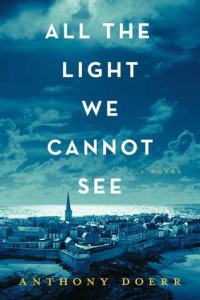 Marie-Laure is a blind Parisian girl whose father works at the Museum of Natural History. When she goes blind at age 6, her father builds a to-scale model of their neighborhood so she can learn her way around gradually. Then the Nazis occupy Paris. They flee to Saint-Malo, where they find refuge with extended relatives, Madame Manec and shell-shocked Etienne. Oh, and Marie-Laure’s father carries a jewel with him that may or may not be magical but is most certainly valuable, which is sought tirelessly by a German jeweler, von Rumpel. Meanwhile, Werner is a German orphan who is very good at radios. His talent wins him a place in the Hitler Youth, a brutal school where he is faced with moral dilemmas in which he may or may not choose wisely. Eventually, as you suspect, the parallel story lines converge.
Marie-Laure is a blind Parisian girl whose father works at the Museum of Natural History. When she goes blind at age 6, her father builds a to-scale model of their neighborhood so she can learn her way around gradually. Then the Nazis occupy Paris. They flee to Saint-Malo, where they find refuge with extended relatives, Madame Manec and shell-shocked Etienne. Oh, and Marie-Laure’s father carries a jewel with him that may or may not be magical but is most certainly valuable, which is sought tirelessly by a German jeweler, von Rumpel. Meanwhile, Werner is a German orphan who is very good at radios. His talent wins him a place in the Hitler Youth, a brutal school where he is faced with moral dilemmas in which he may or may not choose wisely. Eventually, as you suspect, the parallel story lines converge.
So, it’s certainly got pathos–how could it not with a blind pre-teen girl vaguely involved in the French resistance? And it’s creative and has a compelling perspective–Doerr is telling a story that could be trite, but he makes it pretty fresh. And I really enjoyed certain threads that he wove throughout the book: the role of radio, for instance, was very well drawn in both Marie-Laure’s and Werner’s arcs, and I thought very creative and surprisingly subtle. Marie-Laure’s fascination with molluscs and snails; Marie’s father’s ingenious puzzles; Werner’s talent with the radio wires–these were all very poetic, even cinematic. Werner’s friendship with his classmate Frederick and Marie-Laure’s friendship with Etienne were also both very touching; in fact, these were my favorite parts of the book and I often found the secondary characters more intriguing than the protagonists. I especially liked Etienne and the way he showed love for Marie-Laure in his eccentric, shell-shocked way, afraid of the world, but willing to face it for her. I also liked the ending just fine–I gather that others found it unfulfilling, but I thought it was appropriate.
However, despite enjoying individual chapters, I simply couldn’t connect with the book overall. I found myself constantly looking at the page numbers to see how much I had left. (This started at like page 25, at which point I put it down and read a whole other book before picking it up again.)
A big part of the reason for this is that the story skips around a lot. Not only are there like 8 sections that take place out of chronological order between 1939 and 1945, but each (short) chapter is written about a different character. You finish 2 pages about Marie-Laure, and then it’s 3 pages about Werner, and then 3 pages maybe about von Rumpel, back to Marie-Laure, etc. For the whole book. I felt like I never got to really spend time with the characters, like they were created for the sole purpose of drawing a pretty picture. Plus, and this is a personal pet peeve, I know, but: it’s all written in present tense. With sentences that are, yes, sometimes very cinematic and beautiful, but frequently followed by short, abrupt, adjective-laden sentences that I found grating.
So basically, I didn’t enjoy the style, and it’s hard to keep that up for 500+ pages…especially because I wasn’t sure where I was going in this plot. Why the maybe-magical diamond? Why the chronological skipping around? It was like poetry that everyone thinks is deep just because it doesn’t rhyme.
That said, I understand why this is a best-seller–it’s very pretty, and the characters are well-imagined, and the plot feels new in a way that I think is hard to do when you’re writing about WWII. Doerr does have a way with imagery, and his individuals sentences can sparkle. But the carefully wrought sentences did not add up to more than the sum of their parts for me–in fact, combined, they often felt burdensome rather than illuminating.
